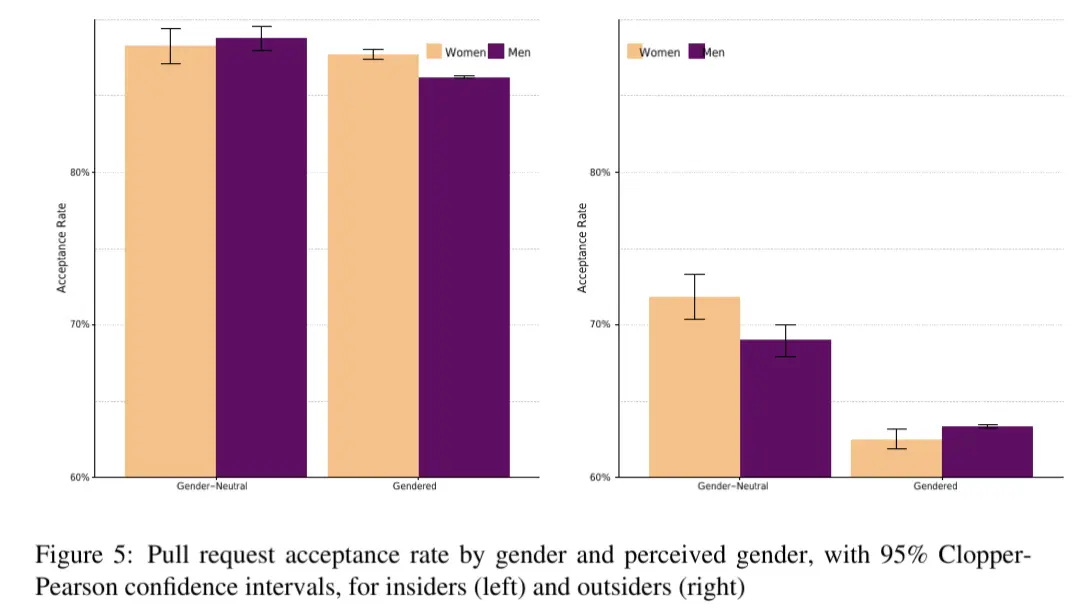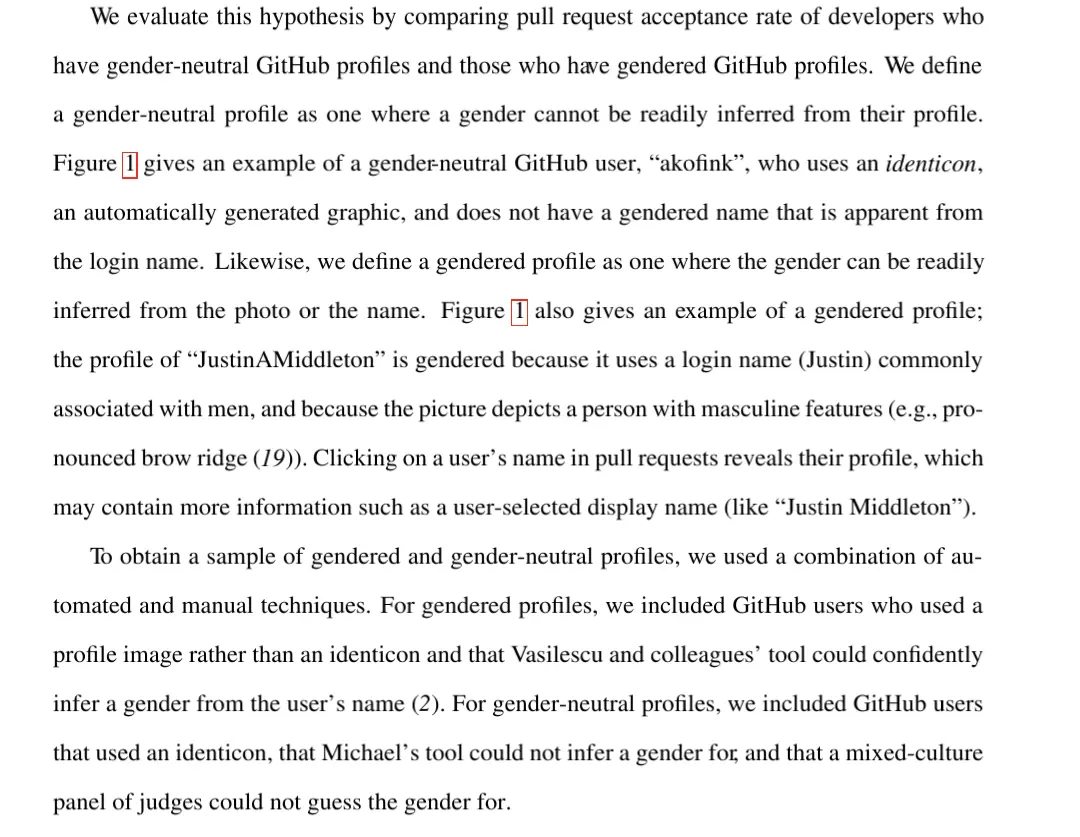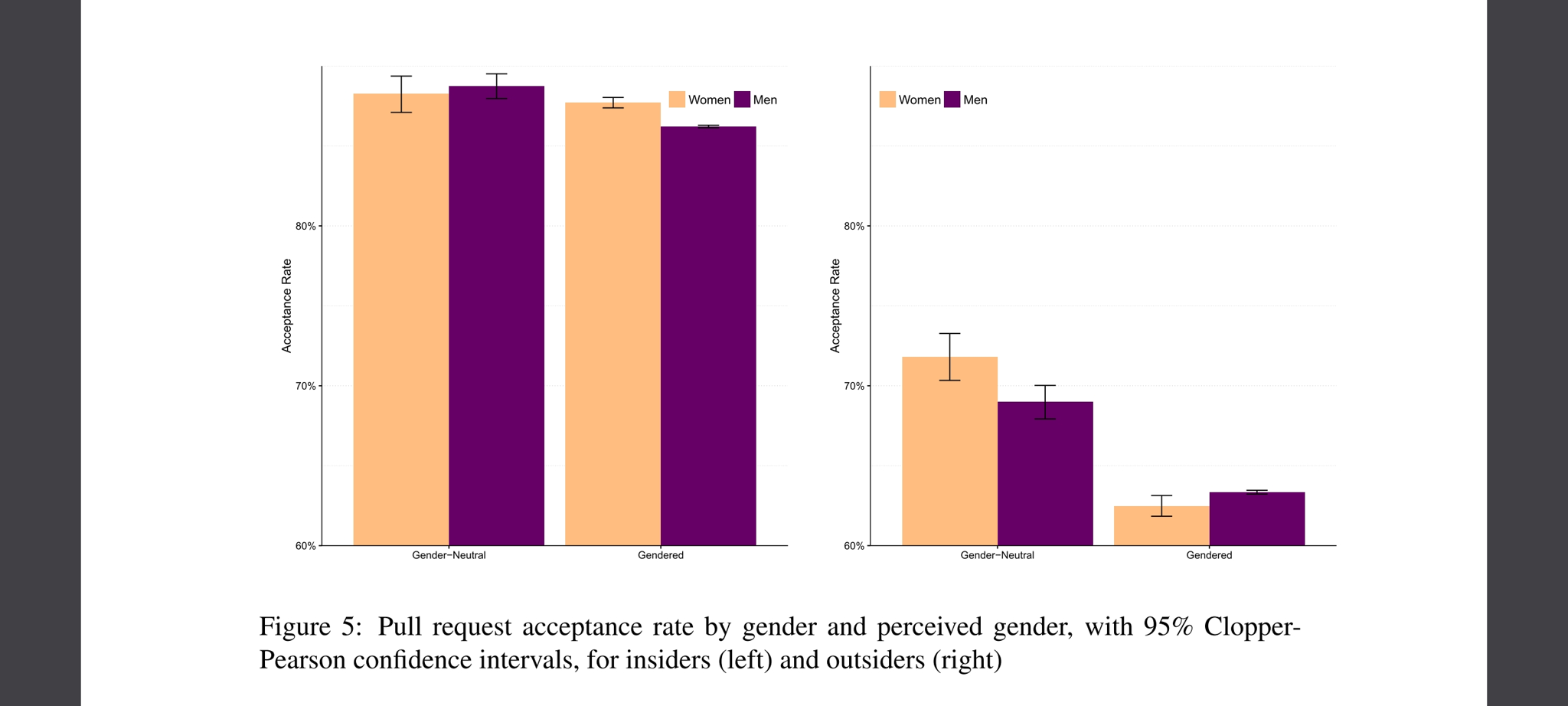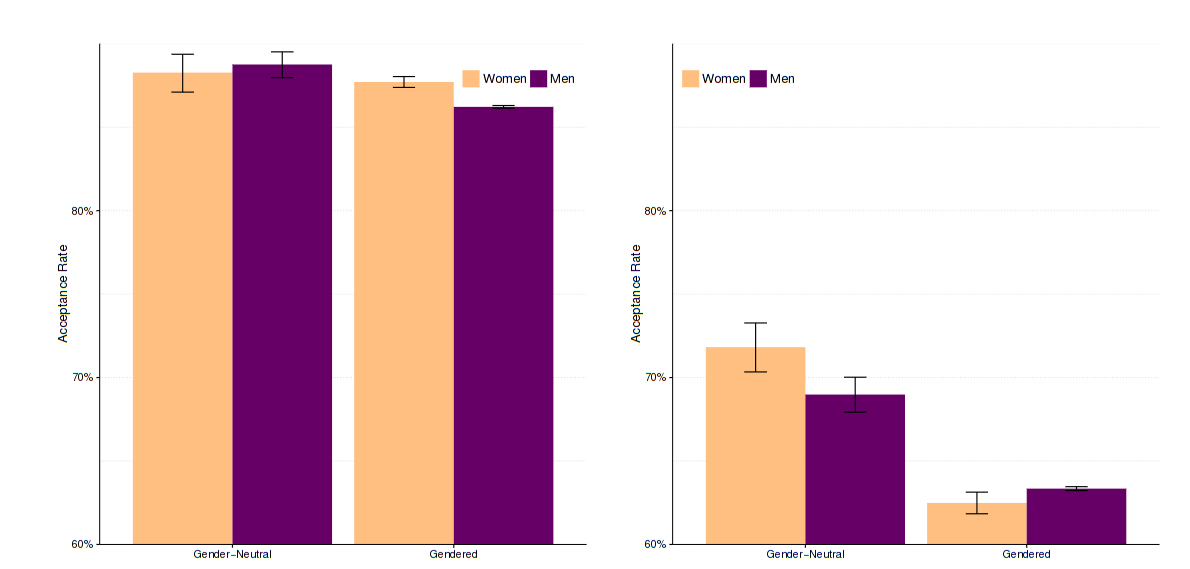Our results show that women’s contributions tend to be accepted more often than men’s [when their gender is hidden]. However, when a woman’s gender is identifiable, they are rejected more often. Our results suggest that although women on GitHub may be more competent overall, bias against them exists nonetheless.
Anyone found the specific numbers of acceptance rate with in comparison to no knowledge of the gender?
On researchgate I only found the abstract and a chart that doesn’t indicate exactly which numbers are shown.
edit:

Interesting for me is that not only women but also men had significantly lower accepance rates once their gender was disclosed. So either we as humans have a really strange bias here or non binary coders are the only ones trusted.
edit²:

I’m not sure if I like the method of disclosing people’s gender here. Gendered profiles had their full name as their user name and/or a photography as their profile picture that indicates a gender.
So it’s not only a gendered VS. non-gendered but also a anonymous VS. indentified individual comparison.
And apparantly we trust people more if we know more about their skills (insiders rank way higher than outsiders) and less about the person behind (pseudonym VS. name/photography).
Thanks for grabbing the chart.
My Stats 101 alarm bells go off whenever I see a graph that does not start with 0 on the Y axis. It makes the differences look bigger than they are.
The ‘outsiders, gendered’ which is the headline stat, shows a 1% difference between women and men. When their gender is unknown there is a 3% difference in the other direction (I’m just eyeballing the graph here as they did not provide their underlying data, lol wtf ). So, overall, the sexism effect seems to be about 4%.
That’s a bit crap but does not blow my hair back. I was expecting more, considering what we know about gender pay gaps, etc.
…or the research is flawed. Gender identity was gained from social media accounts. So maybe it’s a general bias against social media users (half joking).
Thank you. Unfortunately, your link doesn’t work either - it just leads to the creative commons information). Maybe it’s an issue with Firefox Mobile and Adblockers. I’ll check it out later on a PC.
Looking at their comment history they seem to allways include that link to the CC license page in some attempt to prevent the comments from being used with AI.
I have no idea of if that is actually a thing or just a fad, but that was the link.
Thanks for pointing that out.
Seems like a wild idea as… a) it poisons the data not only for AI but also real users like me (I swear I’m not a bot :D). b) if this approach is used more widely, AIs will learn very fast to identify and ignore such non-sense links and probably much faster than real humans.
It sounds like a similar concept as captchas with annoy real people, yet fail to block out bots.
Page 15 of the pdf has this chart

(note the vertical axis starts at 60% acceptance rate)
Their link wasn’t to the paper but to the license to poison possible AIs training their models on our posts. Idk if that actually is of any use though
They didn’t use very comprehensive research methods. Also they only used Github.
First, from the GHTorrent data set, we extract the email addresses of GitHub users. Second, for each email address, we use the search engine in the Google+ social network to search for users with that email address. Third, we parse the returned users’ ‘About’ page to scrape their gender.
a bias against men exists, that is, a form of reverse discrimination.
How is it reverse discrimination. It’s still plain old discrimination. I’m starting to smell a biased research here. Or at least the researchers have a bias.
Clearly discrimination is only against woman thus reverse discrimination is against man. /s
any bias that doesn’t confirm my bias is reverse bias
see also: reverse racism
Thanks for pointing it out. There is clearly room for a lot of error.
This research isn’t peer reviewed so I wouldn’t take it at face value just yet.
From the post’s link:
We hypothesized that pull requests made by women are less likely to be accepted than those made by men. Prior work on gender bias in hiring – that women tend to have resumes less favorably evaluated than men (5) – suggests that this hypothesis may be true.
To evaluate this hypothesis, we looked at the pull status of every pull request submitted by women compared to those submitted by men. We then calculate the merge rate and corresponding confidence interval, using the Clopper-Pearson exact method (15), and find the following:
Open Closed Merged Merge Rate 95% Confidence Interval Women 8,216 21,890 111,011 78.6% [78.45%, 78.87%] Men 150,248 591,785 2,181,517 74.6% [74.56%, 74.67%] 4 percentage point difference overall.
Pull requests can be made by anyone, including both insiders (explicitly authorized owners and collaborators) and outsiders (other GitHub users). If we exclude insiders from our analysis, the women’s acceptance rate (64.4%) continues to be significantly higher than men’s (62.7%) (χ2(df = 2, n = 2, 473, 190) = 492, p < .001)
Emphasis mine. that’s 1.7 percentage points.
The final paragraph also omits how the acceptance changes after gender is “revealed” (username, profile image). The graph doesn’t help either
For outsiders, we see evidence for gender bias: women’s acceptance rates are 71.8% when they use gender neutral profiles, but drop to 62.5% when their gender is identifiable. There is a similar drop for men, but the effect is not as strong. Women have a higher acceptance rate of pull requests overall (as we reported earlier), but when they’re outsiders and their gender is identifiable, they have a lower acceptance rate than men.
So women drop from 71.8% to 62.5% = 9,3 percentage points, and they say it’s more than men, but don’t reveal the difference. Only graph has an indication (unless I’m missing a table) and it may be 5 (?) percentage points for men. Which would be about 4 percentage points between both genders.

Figure 5: Pull request acceptance rate by gender and perceived gender, with 95% Clopper-Pearson confidence intervals, for insiders (left) and outsiders (right) The conclusion:
Our results suggest that although women on GitHub may be more competent overall, bias against them exists nonetheless.
That’s quite exaggerated for <=5 percentage points. Especially for the number of people involved.
Out of 4,037,953 GitHub user profiles with email addresses, we were able to identify 1,426,121 (35.3%) of them as men or women through their public Google+ profiles.
Maybe I missed it, but how many of those were women and how many made PRs?
in a 2013 survey of the more than 2000 open source developers who indicated a gender, only 11.2% were women
Let’s compare the PR rate per gender:
Let’s say the percentage of women did not increase since 2013, which I’d find difficult to believe, that’s 1,269,247 men and 156,873 women. Men made 150,248 + 591,785 + 2,181,517 = 2,923,550 PRs. Women made 8,216 + 21,890 + 111,011 = 141,117 PRs. That’s ~2.3 PRs per man and ~0,9 PRs per woman. If the percentage changed and more women became contributors, that would decrease the PRs per woman.
That leads me to ask:
- are women more hesitant to contribute PRs that might not be merged? if so, it might contribute to why their PRs are merged more often
- are the women with accounts on github more likely to be people who have some kind of education in the IT field? if there are less hobbyist women (percentage-wise) on github, and more hobbyist men who just chuck their stuff online then decide to contribute to a project, it might contribute to PR acceptance (you’re comparing pros to amateurs)
- what does a similar acceptance rate for double the amount of PRs for men actually say? I don’t know, but it might be pertinent.
I very much encourage humans to contribute to opensource. So, while this paper says something about the current state of things, it doesn’t seem like it’s saying much. The differences in pull request acceptance are not very significant (<5 percentage points) to me
I wonder if experiences from 12 years ago and numbers from 8 years ago still hold true as of today.
Why would someone know your gender, out your identity?




